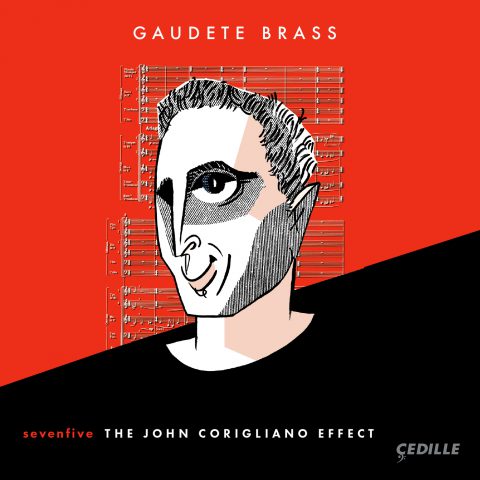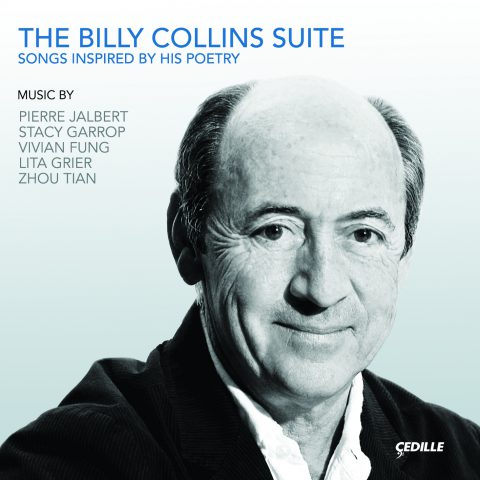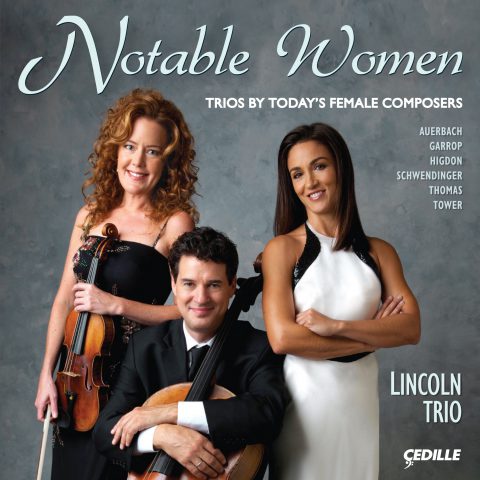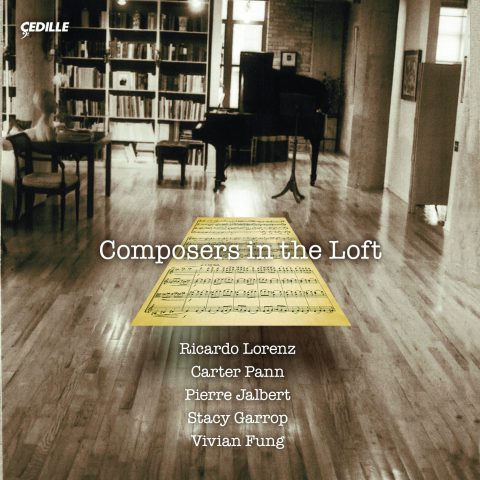Store
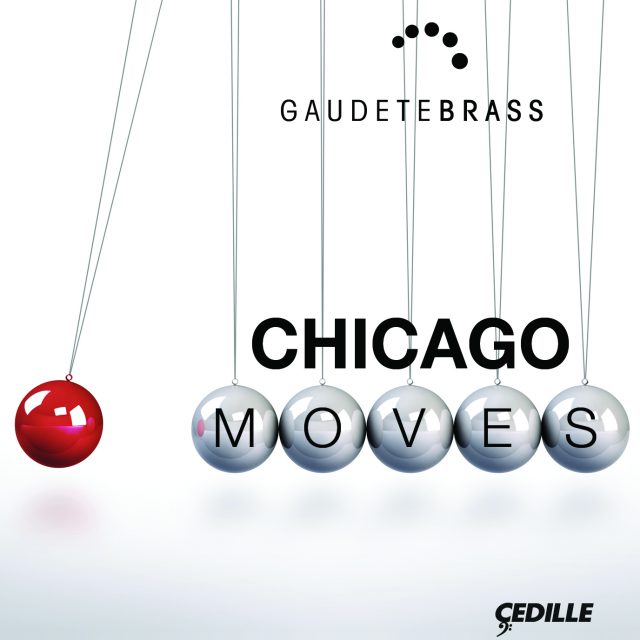
Store
Chicago Moves
Gaudete Brass makes its Cedille Records debut with Chicago Moves, an album of new and diverse American works for brass quintet. All were composed in the last six years, and all but one were written expressly for the Chicago-based ensemble of young brass virtuosos and receive their world-premiere recordings on the new CD.
World premieres include the title work, David Sampson’s Chicago Moves (2011), a tribute to the city’s multifaceted character through “third stream” classical-meets-jazz melodies atop an almost minimalist groove. Rob Deemer’s Brass (2012) explores the rich and varied textures and sounds unique to the brass family of instruments. Brian Baxter’s A Great Commercial City, another valentine to Gaudete Brass’s hometown, draws its melodic and harmonic content from a mid-19th century folk song praising the fertile farmlands of Illinois. Stacy Garrop’s Helios (2011) depicts the classical Greek sun god’s blazing journey across the daytime sky and calm, nightly slumber in his golden boat. John Cheetham’s Sonata for Brass Quintet (2008), written in the classical sonata form of fast-slow-fast movements, includes solos for each instrument. James Woodward’s Gaudete (2007), the quintet’s very first commission, conveys the jubilant spirit inherent in the ensemble’s name, which comes from the Latin word for “rejoice.”
Chicago Moves also includes celebrated composer Joan Tower’s Copperwave (2006), a work in which musical ideas move in waves, sometimes to a Latin American-style rhythm.
Founded in 2004, Gaudete Brass is devoted to presenting serious chamber music at the highest level of excellence and encouraging worldwide appreciation of the art of chamber music on brass instruments. Ensemble members are trumpeters Ryan Berndt and Bill Baxtresser, horn player Julia Filson, trombonist Paul Von Hoff, and tuba player Scott Tegge.
Preview Excerpts
JAMES WOODWARD (b. 1978)
JOHN CHEETHAM (b. 1939)
Sonata for Brass Quintet
BRIAN BAXTER (b. 1985)
STACY GARROP (b. 1969)
ROB DEEMER (b. 1970)
Brass
DAVID SAMPSON (b. 1951)
Chicago Moves
JOAN TOWER (b. 1938)
Artists
Program Notes
View Album BookletChicago Moves
Notes by Paul Von Hoff
About the Project
Brass players playing chamber music together can be traced back to the ensembles of cornetti and trombones that were used in the 16th and 17th centuries to perform along with singers or as an independent ensemble. These groups were often in the now familiar combination of two soprano instruments, an alto, a tenor, and a bass. This combination remained active through the time of Bach. While there have been small pockets of brass chamber music since then, only in the last 60 years has there emerged for brass quintet anything comparable to the wealth of music available to string or wind players. On Chicago Moves, we share seven new works by American composers, all written in the last six years. Except for Joan Tower’s Copperwave, everything on this album was written for Gaudete Brass and receives its premiere recording here. This album is designed to showcase the wonderful quality of today’s literature for brass quintet and demonstrate that, as an ensemble, the modern brass quintet has truly arrived.
About the Music
James Woodward
Gaudete (2007)
Composer and pianist James Woodward (b. 1978) has received a Meet the Composer Grant, the 2006 BMI Pete Carpenter Film Scoring Fellowship, the 2007 Kappa Kappa Psi Alpha Beta Chapter Commission Com-petition, a residency at the Kimmel Harding Nelson Center for the Arts, and a Fellowship at the Virginia Arts Festival John Duffy Composers Institute. His tuba concerto, featured on the debut CD of Alan Baer, Principal Tuba of the New York Philharmonic, was called a “Tour de force… a great piece!” by Tuba News. Woodward studied with many prominent composers, including John Downey, Ronald Foster, Stephen Hartke, Jody Rockmaker, James DeMars, and Rodney Rogers, and is an Assistant Professor of Music Theory and Composition at Jacksonville State University. His works are published by Cimarron Music Press, Daehn Publications, and GIA Publications. James is currently writing and performing for various films, commissions, and other projects. Recordings of his works are available on Mark Records and Baer Tracks Music.
Intrigued by the name “Gaudete” and its meaning, “rejoice,” James Woodward agreed to write this piece for the quintet in that spirit. The work contains many extended harmonies — heard either in tightly packed short bursts or stretched out through expansive melodic lines — giving it a flavor associated with American music. Gaudete Brass is thrilled to have been able to work with Mr. Woodward to present this piece as the quintet’s first commissioned work.
John Cheetham
Sonata for Brass Quintet (2008)
Professor Emeritus at the University of Missouri-Columbia (1969–2000), John E. Cheetham (b. 1939) has written compositions for virtually all media that have been widely performed in the U.S. and abroad. He has received numerous commissions including from the Kentucky Derby Museum, Texas Tech University, the Atlanta Symphony Brass Quintet, Belhaven College, University of Southern Mississippi Southern Chorale, Springfield (MO) Symphony Orchestra, Summit Brass, and the Air Force Band of the Midwest, as well as from individual soloists. Cheetham’s honors include annual ASCAP Special Awards since 1988 and a Centennial Distinguished Alumni Award from the University of New Mexico. His works have been recorded on the Crystal, Concord, Mark, Pro-Arte, Summit, and NPR Classic labels.
Composed in 2007/2008, John Cheetham’s Sonata for Brass Quintet was commissioned in honor of Paul and Greta Leighton by their loving family for Gaudete Brass. Its three movements adhere to the classical sonata pattern of fast-slow-fast. The first movement opens with a sprightly triadic theme that is passed among the members of the ensemble. Following a brief development of the first idea, Cheetham introduces a repeated-note motif. A more extensive development of both ideas ensues, followed by a recapitulation of material from the beginning. Movement two opens with a lyrical trombone solo. A slightly more animated B section, featuring short solos for each of the other instruments, follows. The trombone returns near the end of the movement to complete the ternary design. The energetic third movement begins with the ensemble in unison. A highly syncopated theme follows and becomes the recurring melodic idea for this jazzy rondo. Contrasting material interrupts the rondo idea several times as the movement concludes in a burst of activity.
Brian Baxter
A Great Commercial City (2011)
Brian Baxter (b.1985) is a Chicago-based composer, drummer, and new music producer. Working primarily through the idioms of orchestral and chamber music, Brian’s compositions are strongly influenced by his personal experiences of places and environments. Recent performances of Brian’s music have taken place across the USA by Gaudete Brass, Chicago Q Ensemble, Chicago Youth Symphony Orchestras, Champaign-Urbana Symphony Orchestra, Palomar Ensemble, and many others. Co-founder of the Chicago Composers Orchestra, a group dedicated to the performance and advocacy of orchestral music by living composers, Brian serves as President of its Board of Directors. He is an active drummer with new music collective, the Sissy-Eared Mollycoddles. He also works in operations with the Chicago Youth Symphony Orchestras, where he founded a Composition Seminar for student composers. Brian has won ASCAPLUS Awards three years in a row: 2009–2011. He received his M.M. in composition from Roosevelt University’s Chicago College of Performing Arts and his B.M. in composition from Illinois Wesleyan University. Brian is a member of ASCAP and publishes his music through ATIHADSO MUSIC.
Brian Baxter’s A Great Commercial City is a one-movement work in three sections inspired by Chicago, the city that he and Gaudete Brass both call home. Its melodic and harmonic content is loosely based on the folk song “El-a-noy” that encouraged fa mi-lies of the mid-1800s to move to the fertile land of Illinois. The fourth verse references Chicago as “a great commercial city . . . right on the border line.” The piece’s three sections represent different characteristics of Chicago: boldness, independence, and strength. A Great Commercial City is dedicated to Gaudete Brass, which commissioned the work.
Stacy Garrop
Helios (2011)
A composer creating music of great expressive power and masterful technical control, Stacy Garrop (b. 1969) has received numerous awards, commissions, and grants, including the Detroit Symphony Orchestra’s Elaine Lebenbom Memorial Award, Raymond and Beverly Sackler Music Composition Prize, two Barlow Endowment commissions, Pittsburgh New Music Ensemble’s Harvey Gaul Competition, and the Chicago Symphony Orchestra’s First Hearing Composition Competition. Her music is published by Theodore Presser Company and recorded by labels including Cedille, Innova, Equilibrium, and Ravello Records. She has attended residences at the Aspen Music Festival, Atlantic Center for the Arts, Banff Centre for the Arts, MacDowell Colony, Millay Colony, Ragdale Foundation, Wellesley Composers Conference, and Yaddo, and has served as composer-in-residence for Chicago’s Music in the Loft chamber series and the Albany Symphony Orchestra. Gaudete Brass commissioned Stacy Garrop to write Helios in 2011. She describes the piece as follows:In Greek mythology, Helios was the god of the sun. His head wreathed in light, he daily drove a chariot drawn by four horses (in some tales, the horses are winged; in others, they are made of fire) across the sky. At the end of each day’s journey, he slept in a golden boat that carried him on the Okeanos River (a fresh water stream that encircled the flat earth) back to his rising place. The cyclic journey of Helios is depicted in this short work for brass quintet. The first half is fast paced and very energetic, while the second half is slow and serene, representing day and night.
Rob Deemer
Brass (2012)
The works of Rob Deemer (b. 1970) have appeared in concert halls, jazz clubs, stage shows, films, and festivals across the country and around the world. Ensembles commissioning his works include Gaudete Brass, the Rascher Saxophone Quartet, U.S. Army Orchestra (Pershing’s Own), Buffalo Chamber Players, Brightmusic Ensemble, Quintet of the Americas, Florestan Art Song Project, Washington Trombone Ensemble, Millar Brass Ensemble, Chicago Trombone Consort, the Tosca and MacArthur String Quartets, Austin Civic Orchestra, and Kishwaukee Symphony, as well as many university ensembles. His music has received recognitions by BMI, Downbeat Magazine, and Voices of Change. Deemer holds degrees in Composition from the University of Texas and Northern Illinois University, and in Film/Television Scoring from University of Southern California. He is currently Assistant Professor and Head of Composition at SUNY Fredonia and on the composition faculty at Interlochen Summer Arts Camp.Rob Deemer’s Brass invites listeners and performers to explore sounds unique to the brass family of instruments. Each movement explores the emotive and communicative power of one of those elements in a way that a visual artist might explore the depths of meaning and rich shading of a single color. With movements titled “Bell,” “Mute,” and “Slide,” Deemer takes listeners on a journey through the rich and varied textures and sounds available to brass players, such as the muted brass colors of the second movement or the bell-like tones of the first. Rob Deemer wrote Brass in December 2011 for Gaudete Brass, which premiered the work in New York a month before the recording sessions for this CD.
David Sampson
Chicago Moves (2011)
David Sampson (b. 1951) is one of the truly unique voices of his generation, enjoying performances by major orchestras, noted soloists, and internationally touring ensembles. From 1988 to 2007, he served as Composer-in-Residence of the Colonial Symphony Orchestra. His extensive output includes commissions and premieres with the New Jersey, Akron, National, and American Symphony Orchestras; the Aspen Music Festival; Chicago Chamber Musicians; Joffrey II Ballet; American Brass Quintet; and Amherst Saxophone Quartet, among others. He has received major grants from the National Endowment for the Arts, American Academy of Arts and Letters, Chamber Music America, Barlow Endowment, Pew Charitable Trusts, New Jersey State Arts Council, Jerome Foundation, Cary Trust, and Geraldine R. Dodge Foundation. Mr. Sampson holds degrees from the Curtis Institute of Music, Hunter College, Manhattan School of Music, and the Ecoles d’Art Americaines. His music is widely published and has been recorded on the Channel Recordings, Albany, and Summit labels by a variety of soloists, ensembles, and orchestras.
David Sampson wrote Chicago Moves for Gaudete Brass in 2011. The piece is in four movements, each of which showcases an aspect of life in Chicago, represented by a place or landmark. The piece is a melange of third stream (i.e., between classical and jazz) style melodies overlaid onto an almost minimalist groove that is passed between the instruments. Sampson makes extensive use of mutes, flugelhorns, and inter-connected lines to produce colors more like those of a string quartet or vocal choir than those typically associated with brass instruments. The work was commissioned for Gaudete Brass by Giddings and Webster Mouthpieces, The Venzon Family, Earl and Judy Baxtresser, and the Chicago Modern Brass Project.
Joan Tower
Copperwave (2006)
Joan Tower (b. 1938) is widely regarded as one of America’s most important living composers. During a career spanning more than fifty years, she has made lasting contributions to musical life in the United States as a composer, performer, conductor, and educator. Her works have been commissioned by major ensembles including the Emerson and Tokyo quartets; soloists Carol Wincenc, Paul Neubauer, and David Shifrin; and the orchestras of Chicago, New York, Pittsburgh, St. Louis, and Washington DC, among many others. Tower was the first composer chosen for a Ford Made in America consortium commission of sixty-five orchestras. The resulting piece was released on an album that collected three Grammy Awards. In 1990, she became the first woman to win the prestigious Grawemeyer Award. Tower has held orchestral residencies with the St. Louis and Pittsburgh Symphonies and New York’s Orchestra of St. Luke’s. She also served as pianist for the Da Capo Chamber Players. Tower is a professor at Bard College, where she has taught since 1972. Her music is published by Associated Music Publishers.
Joan Tower’s Copperwave was commissioned by the Juilliard School for the American Brass Quintet. The composer writes:
My father was a geologist and mining engineer and I grew up loving everything to do with minerals and rocks. Copper is a heavy but flexible mineral that is used for many different purposes and most brass instruments are made of copper. The ideas in this piece move in waves, sometimes heavy ones and at other times lighter — also in circles, turning around on the same notes. Occasionally, there is a Latin-type of rhythm that appears, which is a reminder of my years growing up in South America where my father was working as a mining engineer.
Album Details
Total Time: 63:00
Producer: Judith Sherman
Engineer: Bill Maylone
Editing Assistance: Jeanne Velonis
Recorded: February 14–17, 2012, at Goshen College, Goshen, Indiana
Stage Managers: Brian Mast and Brian Wiebe
Front Cover Design: Ryan Berndt
Booklet & Inlay Card Design: Nancy Bieschke
© 2012 Cedille Records/Cedille Chicago
CDR 90000 136
